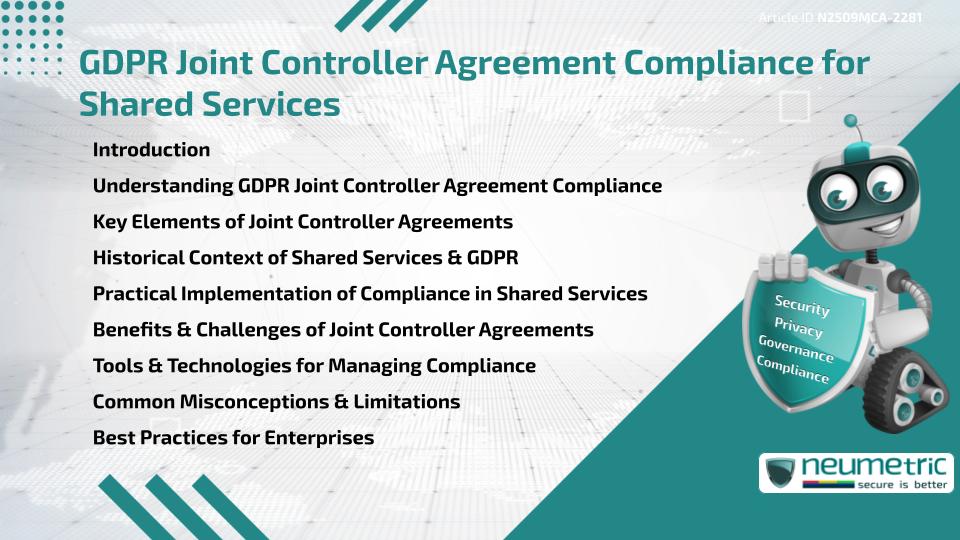Table of Contents
ToggleIntroduction
GDPR Joint Controller Agreement Compliance ensures that enterprises working together in shared services environments manage their responsibilities under the General Data Protection Regulation [GDPR]. A joint Controller Agreement defines how multiple Organisations jointly decide the purpose & means of processing Personal Data. For enterprises, Compliance with these Agreements is essential to safeguard Personal Data, allocate Responsibilities clearly & avoid Disputes or Penalties. This article explores the meaning of GDPR Joint Controller Agreement Compliance, the structure of such Agreements, their historical roots, practical implementation in shared services, benefits, challenges & Best Practices for enterprises.
Understanding GDPR Joint Controller Agreement Compliance
GDPR Joint Controller Agreement Compliance refers to the adherence of enterprises to Article 26 of the GDPR, which requires joint Controllers to transparently define Roles & Responsibilities. In shared services, where multiple entities process data collaboratively, such Agreements ensure Accountability & Clarity. Unlike Data Processor arrangements, Joint Controller Agreements place equal responsibility on the parties involved.
Key Elements of Joint Controller Agreements
An effective joint Controller Agreement includes:
- Defined roles & responsibilities for each Controller.
- Allocation of tasks such as handling subject access requests or reporting Data Breaches.
- Transparent communication Policies for Data Subjects.
- Clear liability frameworks in case of non-Compliance.
When integrated with GDPR joint Controller Agreement Compliance, these elements minimise confusion & strengthen enterprise Privacy programs.
Historical Context of Shared Services & GDPR
Before GDPR, many Organisations engaged in shared services without explicit Agreements. This often led to unclear Accountability when handling Personal Data. GDPR changed this by requiring formalised Agreements whenever two or more Controllers jointly determine how data is processed. The Regulation not only standardised Accountability but also reduced the ambiguity that often surrounded cross-enterprise collaborations.
Practical Implementation of Compliance in Shared Services
Enterprises can achieve GDPR joint Controller Agreement Compliance through the following steps:
- Drafting clear Agreements that are signed & accessible to all parties.
- Establishing workflows for handling Requests & Incidents.
- Using joint Compliance teams to oversee operations.
- Regularly reviewing & updating Agreements to reflect changes in services or regulations.
This approach ensures shared services remain aligned with both Legal requirements & Business Objectives.
Benefits & Challenges of Joint Controller Agreements
The benefits of GDPR joint Controller Agreement Compliance include stronger Data Protection, reduced Legal disputes & enhanced Trust between Partners. It also provides clarity for individuals whose data is being processed, as they know which entity to approach for concerns.
Challenges, however, include negotiating Agreements that satisfy all parties, managing complex data flows across Organisations & maintaining Compliance when services or technologies evolve.
Tools & Technologies for Managing Compliance
Several tools support GDPR joint Controller Agreement Compliance, such as contract management software, workflow automation systems & Compliance monitoring platforms. These technologies streamline Documentation, track Accountability & facilitate Communication between Controllers. Similar to a project management dashboard, they provide visibility & coordination across multiple Stakeholders.
Common Misconceptions & Limitations
One misconception is that joint Controller Agreements shift liability from one party to another. In reality, GDPR makes all joint Controllers equally Accountable to Regulators & Data Subjects. Another limitation is that Agreements may not fully address unforeseen disputes, requiring Organisations to maintain flexibility & ongoing dialogue.
Best Practices for Enterprises
To strengthen GDPR joint Controller Agreement Compliance in shared services, enterprises should:
- Draft Agreements in plain language for clarity.
- Ensure transparency by publishing key elements of Agreements.
- Regularly train staff on their roles within the Agreement.
- Maintain open communication between Controllers to address emerging issues.
Takeaways
- GDPR Joint Controller Agreement Compliance ensures Accountability in shared services.
- Agreements must clearly define roles, responsibilities & liabilities.
- Tools & Automation simplify Compliance management.
- All Controllers share equal responsibility under GDPR.
- Clear Agreements strengthen Trust & reduce Legal Risks.
FAQ
What is GDPR joint Controller Agreement Compliance?
It is the process of ensuring enterprises comply with GDPR Article 26 by defining responsibilities in joint data processing arrangements.
Why are joint Controller Agreements important in shared services?
They clarify Accountability, protect Personal Data & reduce Disputes among Organisations.
How is a joint Controller Agreement different from a processor Agreement?
A processor acts under a Controller’s instructions, while joint Controllers share decision-making responsibility equally.
What are the main elements of a compliant joint Controller Agreement?
Defined roles, handling of data subject rights, liability frameworks & transparent communication Policies.
What challenges do enterprises face in joint Controller Agreements?
Challenges include negotiating terms, managing complex shared data & updating Agreements as services change.
Do joint Controller Agreements remove liability from one party?
No, all joint Controllers remain equally Accountable under GDPR.
How can enterprises manage Compliance effectively?
By using Contract Management tools, regular Reviews, joint Compliance teams & transparent Communication practices.
Need help for Security, Privacy, Governance & VAPT?
Neumetric provides organisations the necessary help to achieve their Cybersecurity, Compliance, Governance, Privacy, Certifications & Pentesting needs.
Organisations & Businesses, specifically those which provide SaaS & AI Solutions in the Fintech, BFSI & other regulated sectors, usually need a Cybersecurity Partner for meeting & maintaining the ongoing Security & Privacy needs & requirements of their Enterprise Clients & Privacy conscious Customers.
SOC 2, ISO 27001, ISO 42001, NIST, HIPAA, HECVAT, EU GDPR are some of the Frameworks that are served by Fusion – a SaaS, multimodular, multitenant, centralised, automated, Cybersecurity & Compliance Management system.
Neumetric also provides Expert Services for technical security which covers VAPT for Web Applications, APIs, iOS & Android Mobile Apps, Security Testing for AWS & other Cloud Environments & Cloud Infrastructure & other similar scopes.
Reach out to us by Email or filling out the Contact Form…


